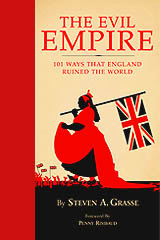Book Review - The Evil Empire
Ad Age
04/13/2007
Press coverage, web presence overhype list of reasons why the Brits owe us big time.
Is it a book? A marketing case study? The amusing rant of a guy with a bit of fried (you say, I say) potato on his shoulder? "The Evil Empire: 101 Ways That England Ruined the World," by Steven A. Grasse -- the gratuitous middle initial a sure sign the author is American—is, of course, all of the above.
The book part didn't take much deduction. There's a cover, pages, words and stuff. Plus it arrived with four press releases telling me it was a book. (Presumably they knew that, as a Brit, I would be too busy drinking my tea and reveling in the empire's former "glory" to figure this out.)
As a case study, "Empire" owes much to Grasse's position as CEO of Gyro, an interesting and aggressive Philadelphia agency that counts itself among those trying to massacre old marketing mores and has stuff like its own clothing line, sneakers, rum and full length movies to show for its original approach.
To drive interest in and gin up controversy about Grasse's book, Gyro the agency created the International Coalition for British Reparations (britishreparations.org). It made viral videos as well as radio, TV and newspaper ads and launched a MySpace page that has received "thousands of hits," according to one of the aforementioned press releases.
Apparently it caused quite a stir. The press release leads us to believe that the book merited coverage by several major British media institutions. Gyro claims "the international publicity from the campaign has been staggering." Given a Google News search threw up about one article from a student newspaper in Philadelphia, this might be a touch of good ol' fashioned hyperbole.
But this thing is sitting in the top 20 books on Amazon.co.uk., so I guess it must have snagged reasonable press across the Pond.
Grasse's attempt to portray the British as having had no sense of humor about the tome is equally questionable. He writes: "The fact they have gotten so worked up by my little book says a lot about England's suppressed feelings of guilt about the misdeeds of their empire." I'm not so sure about that suppression. Perhaps the people I met in my 20-plus years of living in Britain were all exceptions to the rule, but I don't think I ever met someone who wasn't very openly guilty when forced to think about Britain's distinctly inglorious history in the name of "civilizing" the entire planet. (We weren't clever enough to think of hiding behind the idea of "democratizing" the rest of the world.)
I do know very few would take this book too seriously.
Still, it was rather refreshing to see someone eschew the usual bad-teeth (true), bad-food (not so true) stereotypes and get stuck into the Brits with marginally greater significant transgressions, such as, to quote Grasse: "enslaving the world to get their tea fix," "encouraging the eating of meat," "perfecting the spread and tedium of factory life," and "befouling the world's stage with incomprehensible dramas."
Perhaps most importantly, Grasse notes the Brits "made Elton John a knight," which, having happened in my lifetime, leaves me truly shamefaced (though not as embarrassed as the last time I was caught singing along to "Tiny Dancer").
Given the wholesale (re)invasion of this country, particularly the media and marketing worlds, by us Brits, "The Evil Empire" is sure to change hands as a novel office gift. I have already received it as a birthday offering from my publisher, who inscribed it "I knew you were trouble -- now there's proof." I think he knew I'd have a sense of humor about it.




